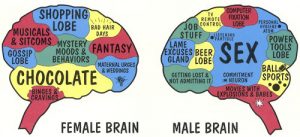Did you catch the headlines about women’s brain size earlier this month?
It turns out that women’s brains are smaller than men’s. This is not particularly startling as men are on the whole larger than women. (Especially when they man-spread of course). A new study from Erasmus University in Rotterdam claims that this correlates with a higher iq for men which in turn means men are smarter.
You would think that scientists might find better things to do. Journalist Angela Saini writes: “this study is part of a longterm attempt to undermine women by male neuro-scientists…. For more than 100 years male anatomists and neuro-scientists have sought to find evidence of women’s intellectual inferiority by comparing their brains to men. It’s surprising that in the 21st century this hasn’t ended.”
It isn’t relevant to get involved in questions of EQ vs IQ as a signifier of smartness here. (Women’s EQ is greater even despite their teeny tiny brains), let’s just say there are smart women and smart men and I’ve yet to notice a correlation with hat size. The man with the biggest head is not necessarily the cleverest person in the room.
Myth debunked.
Another myth about women is that they can multi-task whereas men can’t. And that multi-tasking is bad for everyone. See what happens there? The one thing women are supposedly superior at is bad for you.
There’s contradictory evidence on this one. For part one of the myth, that women can multi-task whereas men can’t: one study from China has endorsed women’s superiority, whereas a Swedish study claimed the opposite. The theory behind this supposed ability is based on pseudo-science. Evolutionary theories claim that women have evolved to better able to juggle tasks (caring for children whilst stirring food for instance), whereas men need focus to hunt animals for the pot. Hard to prove this theory. Especially in our neck of the woods. There isn’t a lot of focussed hunting for food that goes on Bloomsbury, as Meet and Eat supplies all Theobalds Road necessities unless Fab has an unexpected demand for scrambled eggs or bacon sandwiches that is!
For part two of the myth is that multi-tasking is bad for you anyway. University of Glasgow’s Dr Stoet claims that filtering out distractions helps us achieve more. Several commentators think that multi-tasking is killing productivity.
The FT writer and BBC broadcaster concludes that real breakthroughs come from being messy, and doing many things at once, not from focussing on one thing. Multi-tasking helps us synthesise more than one idea, and synthesis is where genius lies. The future of strategy lies in fact in this.
Harford writes in Messy about a series of creative geniuses including Jane Austin, Charles Darwin and nobel laureates who all worked on more than one project at once and picked up another subject when they were stuck in something, which helped them become unstuck. A large number of nobel prize winning scientists switched fields entirely on their journey to Stockholm.
Harford argues that clean desk policies hurt creativity and problem solving. First of all because people dislike being told what to do, so a clean desk mandate causes resentment and time wasting. Secondly because your mess of papers might be self-organising into a genius cross fertilisation that solves the very issue you’re stuck on.
If you happen to be happy to multi-task resist those around you that tell you off about it.
If you can agree with these criteria:
– Doing two things at once means that I am better at both of them
– Checking my smartphone does NOT mean that I am not paying attention
– I deliver original and valuable ideas to my team
Then go ahead, mythbust. Prove the singleminded, focussed, hunters out there wrong every time.
